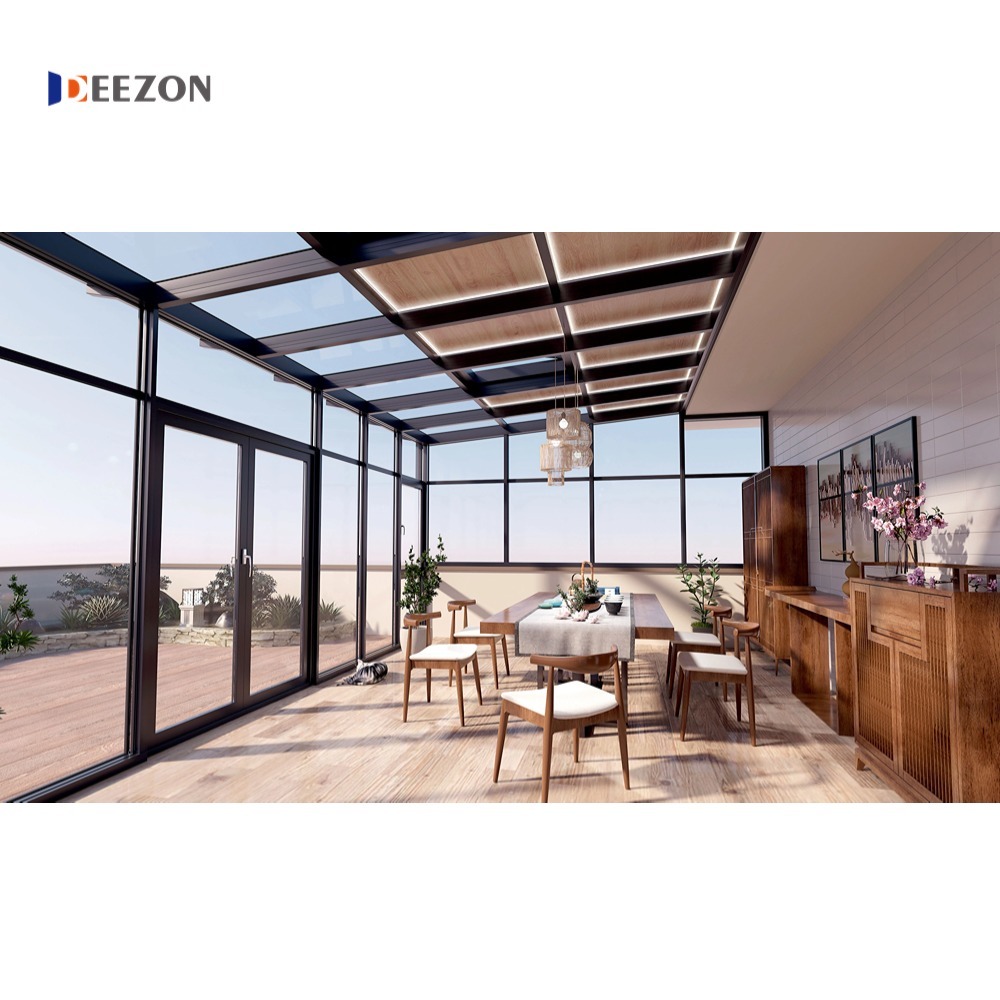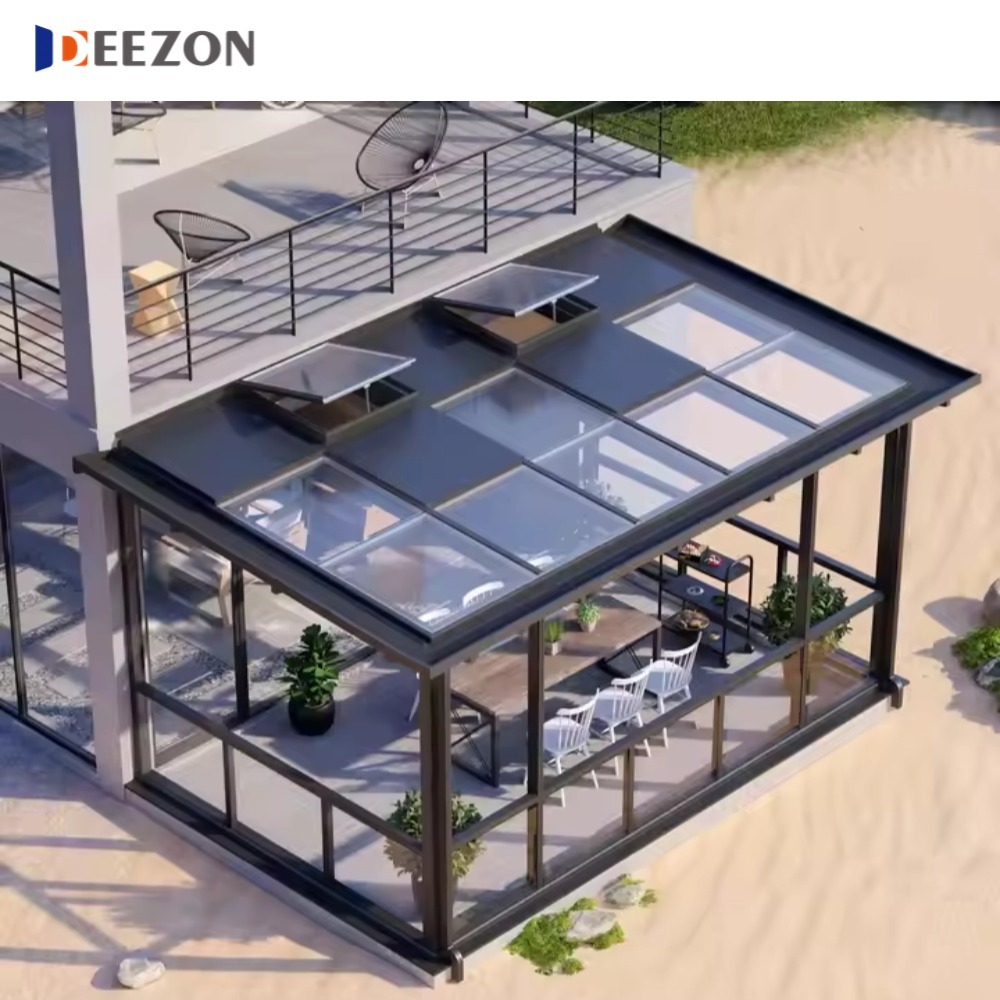Foshan Deezon Windows and Doors Co.,Ltd.
language
Exploring the Benefits of Aluminum Glass Greenhouses for Modern Construction
May 31,2025

Aluminum glass greenhouses are becoming increasingly popular in the construction and decoration industry, especially in the realm of sunrooms and garden spaces. These structures offer a blend of durability, elegance, and functionality that caters to both residential and commercial needs. In this article, we will explore the key aspects of aluminum glass greenhouses that make them a valuable addition to modern architecture.
One of the primary advantages of aluminum glass greenhouses is their lightweight yet robust construction. Aluminum frames provide a strong foundation that can withstand various environmental conditions while being significantly lighter than traditional materials like wood or steel. This not only simplifies the construction process but also reduces the load on the supporting structure, allowing for versatile design possibilities.
Aesthetically, aluminum glass greenhouses can enhance the visual appeal of any building. The transparent glass panels create an open and airy environment that connects indoor spaces with the outdoors, making them ideal for sunrooms, garden rooms, or greenhouses. The use of glass maximizes natural light, creating a bright and inviting atmosphere while minimizing the need for artificial lighting. Additionally, the sleek design of aluminum frames complements modern architectural styles and can be customized in various finishes to match any aesthetic requirement.
From a sustainability perspective, aluminum glass greenhouses contribute positively to energy efficiency. The natural light they harness can reduce electricity consumption, while the insulating properties of modern glass technology can help maintain optimal temperatures inside the structure. Many aluminum glass greenhouses now incorporate energy-efficient glazing options that minimize heat loss, further enhancing their appeal for environmentally conscious builders and homeowners.
When considering the installation of an aluminum glass greenhouse, it's essential to evaluate the specific needs of your project. Factors such as size, orientation, and intended use will influence the design and materials required. Collaborating with experienced architects or contractors who specialize in these structures can lead to a more tailored approach, ensuring that the greenhouse meets both functional and aesthetic goals.
Moreover, maintenance is relatively straightforward with aluminum glass greenhouses. Aluminum is resistant to rust and corrosion, which means the frames require minimal upkeep over time. Glass panels can be easily cleaned to maintain their clarity, ensuring that the greenhouse remains a stunning feature of your property.
In conclusion, aluminum glass greenhouses represent a harmonious blend of style, durability, and sustainability in modern construction. Their versatility makes them suitable for various applications, from enhancing residential properties to serving commercial purposes. As the demand for innovative and efficient building solutions continues to grow, aluminum glass greenhouses are poised to play a vital role in shaping the future of architecture. By exploring these benefits, industry professionals can make informed decisions that align with contemporary design trends and environmental standards.
One of the primary advantages of aluminum glass greenhouses is their lightweight yet robust construction. Aluminum frames provide a strong foundation that can withstand various environmental conditions while being significantly lighter than traditional materials like wood or steel. This not only simplifies the construction process but also reduces the load on the supporting structure, allowing for versatile design possibilities.
Aesthetically, aluminum glass greenhouses can enhance the visual appeal of any building. The transparent glass panels create an open and airy environment that connects indoor spaces with the outdoors, making them ideal for sunrooms, garden rooms, or greenhouses. The use of glass maximizes natural light, creating a bright and inviting atmosphere while minimizing the need for artificial lighting. Additionally, the sleek design of aluminum frames complements modern architectural styles and can be customized in various finishes to match any aesthetic requirement.
From a sustainability perspective, aluminum glass greenhouses contribute positively to energy efficiency. The natural light they harness can reduce electricity consumption, while the insulating properties of modern glass technology can help maintain optimal temperatures inside the structure. Many aluminum glass greenhouses now incorporate energy-efficient glazing options that minimize heat loss, further enhancing their appeal for environmentally conscious builders and homeowners.
When considering the installation of an aluminum glass greenhouse, it's essential to evaluate the specific needs of your project. Factors such as size, orientation, and intended use will influence the design and materials required. Collaborating with experienced architects or contractors who specialize in these structures can lead to a more tailored approach, ensuring that the greenhouse meets both functional and aesthetic goals.
Moreover, maintenance is relatively straightforward with aluminum glass greenhouses. Aluminum is resistant to rust and corrosion, which means the frames require minimal upkeep over time. Glass panels can be easily cleaned to maintain their clarity, ensuring that the greenhouse remains a stunning feature of your property.
In conclusion, aluminum glass greenhouses represent a harmonious blend of style, durability, and sustainability in modern construction. Their versatility makes them suitable for various applications, from enhancing residential properties to serving commercial purposes. As the demand for innovative and efficient building solutions continues to grow, aluminum glass greenhouses are poised to play a vital role in shaping the future of architecture. By exploring these benefits, industry professionals can make informed decisions that align with contemporary design trends and environmental standards.







